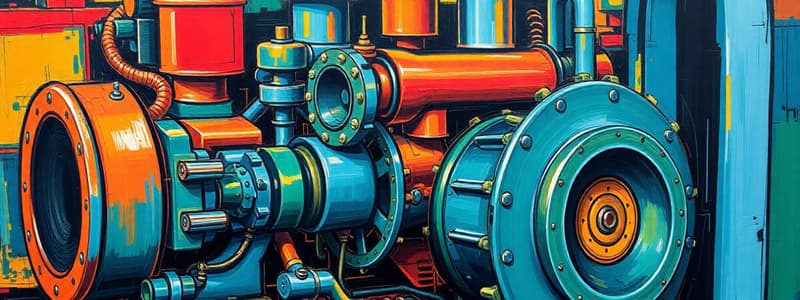Podcast
Questions and Answers
What is the primary purpose of power machinery?
What is the primary purpose of power machinery?
- To perform work in various industries (correct)
- To generate electricity
- To transport goods
- To provide entertainment
Hydraulic machines operate using electrical energy.
Hydraulic machines operate using electrical energy.
False (B)
What component of power machinery is responsible for converting energy to mechanical motion?
What component of power machinery is responsible for converting energy to mechanical motion?
Actuator
An electric motor converts electrical energy into ______.
An electric motor converts electrical energy into ______.
Match the type of power machinery with its description:
Match the type of power machinery with its description:
Which of the following is a common application for pneumatic machines?
Which of the following is a common application for pneumatic machines?
Regular maintenance is not necessary for power machinery to function properly.
Regular maintenance is not necessary for power machinery to function properly.
What factors are considered when measuring the performance of power machinery?
What factors are considered when measuring the performance of power machinery?
Flashcards are hidden until you start studying
Study Notes
Power Machinery Overview
- Definition: Machines that convert various forms of energy into mechanical power.
- Purpose: Used for performing work in industries like construction, agriculture, manufacturing, and more.
Types of Power Machinery
-
Internal Combustion Engines
- Fuel combustion drives pistons.
- Common in vehicles and portable equipment.
-
Electric Motors
- Converts electrical energy into mechanical energy.
- Widely used in industrial applications, appliances, and cars.
-
Hydraulic Machines
- Uses fluid pressure to transmit power.
- Common in heavy equipment like excavators and forklifts.
-
Pneumatic Machines
- Utilizes compressed air to perform work.
- Common in tools like nail guns and air hammers.
Components of Power Machinery
- Power Source: Provides energy (e.g., fuel tank, electrical supply).
- Transmission System: Transfers energy to moving parts (e.g., gears, belts).
- Actuator: Converts energy to mechanical motion (e.g., hydraulic cylinder, electric motor).
- Control System: Regulates the operation (e.g., throttle, joystick).
Efficiency and Performance
- Efficiency measures how well machinery converts energy into work.
- Performance factors include:
- Power output (measured in horsepower or kilowatts).
- Torque (twisting force that provides the ability to do work).
- Speed (rpm - revolutions per minute).
Maintenance and Safety
- Regular maintenance is essential for longevity and performance:
- Lubrication of moving parts.
- Checking and replacing filters.
- Inspecting for wear and tear.
- Safety measures include:
- Proper training for operators.
- Use of personal protective equipment (PPE).
- Following manufacturer guidelines for operation.
Applications of Power Machinery
- Construction: Excavators, bulldozers, concrete mixers.
- Agriculture: Tractors, harvesters, tillers.
- Manufacturing: CNC machines, conveyors, robotic arms.
- Transportation: Automobiles, ships, aircraft.
Conclusion
Understanding power machinery involves recognizing various types, their components, efficiency metrics, and applications across industries, alongside the importance of maintenance and safety practices.
Power Machinery Definition
- Power machinery converts forms of energy into mechanical power.
- Used in many industries for work, including construction, agriculture, and manufacturing.
Types of Power Machinery
- Internal Combustion Engines: Uses fuel combustion to power pistons and is common in vehicles and portable equipment.
- Electric Motors: Converts electrical energy into mechanical energy, used in industrial applications and vehicles.
- Hydraulic Machines: Uses fluid pressure to transmit power, often used in heavy equipment like excavators and forklifts.
- Pneumatic Machines: Uses compressed air to do work, found in tools such as nail guns and air hammers.
Power Machinery Components
- Power Source: Provides energy, examples include fuel tanks and electrical supplies.
- Transmission System: Transfers energy to moving parts through gears and belts.
- Actuator: Converts energy to mechanical motion, seen in hydraulic cylinders and electric motors.
- Control System: Regulates the operation of the machine through things like throttles and joysticks.
Efficiency and Performance of Power Machinery
- Efficiency measures how effective the machinery converts energy into work.
- Key Performance Factors:
- Power Output (measured in horsepower or kilowatts)
- Torque (twisting force for work)
- Speed (rpm - revolutions per minute)
Maintenance and Safety for Power Machinery
- Maintenance: Regular maintenance is key for longevity and performance, including:
- Lubricating moving parts
- Checking and replacing filters
- Inspecting for wear and tear
- Safety: Safety practices are essential for safe operation:
- Proper training for operators
- Using Personal Protective Equipment (PPE)
- Following manufacturer guidelines
Applications of Power Machinery
- Construction: Examples include Excavators, bulldozers, and concrete mixers.
- Agriculture: Examples include Tractors, harvesters, and tillers.
- Manufacturing: Examples include CNC machines, conveyors, and robotic arms.
- Transportation: Examples include Automobiles, ships, and aircraft.
Studying That Suits You
Use AI to generate personalized quizzes and flashcards to suit your learning preferences.




